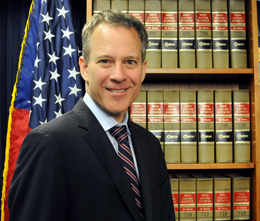 Says manufacturer of Provigil impeded competition by generic prescription makers, recovers money for consumers and state. Schneiderman: New York Led This Effort To Ensure That Money Gets To Those Who Overpaid Because Of Anticompetitive Conduct
Says manufacturer of Provigil impeded competition by generic prescription makers, recovers money for consumers and state. Schneiderman: New York Led This Effort To Ensure That Money Gets To Those Who Overpaid Because Of Anticompetitive Conduct
Attorney General Eric T. Schneiderman today announced a $125 million, 48-state settlement with drug manufacturer Cephalon and affiliated companies (“Cephalon”), now part of Teva Pharmaceutical Industries. The settlement ends a multistate investigation into anticompetitive conduct by Cephalon to protect the profits it earned from having a patent-protected monopoly on the sale of its landmark drug, Provigil. Cephalon’s conduct delayed generic versions of Provigil from entering the market for several years.
“When pharmaceutical companies put profits ahead of people by illegally restricting competition, it harms patients across our state,” said Attorney General Schneiderman. “This misconduct which drives up the cost of prescription drugs will not be tolerated.”
As patent and regulatory barriers that prevented generic competition to Provigil neared expiration, an investigation found that Cephalon intentionally defrauded the Patent and Trademark Office to secure an additional patent, which a court subsequently deemed invalid and unenforceable. Before that court finding, Cephalon was able to delay generic competition for nearly six additional years by filing patent infringement lawsuits. Cephalon settled those lawsuits by paying competitors to delay sale of their generic versions of Provigil until at least April 2012. Because of that delayed entry, consumers, states, and others paid hundreds of millions more for Provigil than they would have had generic versions of the drug launched by early 2006, as expected.
The settlement includes $35 million for distribution to consumers who bought Provigil. New York’s total recovery will be: (1) $6 million in compensation to certain state entities and others who bought off of state contracts; (2) an estimated $3.1 to $4.8 million for distribution to New York consumers who purchased Provigil; and (3) $1.3 million for disgorgement and costs.
This multistate settlement was facilitated by Federal Trade Commission litigation against Cephalon. In May 2015, the FTC settled its suit against Cephalon for injunctive relief and $1.2 billion, which was paid into an escrow account. The FTC settlement allowed for those escrow funds to be distributed for settlement of certain related cases and government investigations.
The settlement is subject to court review, including providing consumers with notice and an opportunity to participate in, object to, or opt out of settlement. The states expect court review will be provided by Judge Mitchell Goldberg of the Eastern District of Pennsylvania, who is overseeing other litigation concerning Provigil against Cephalon and others.

